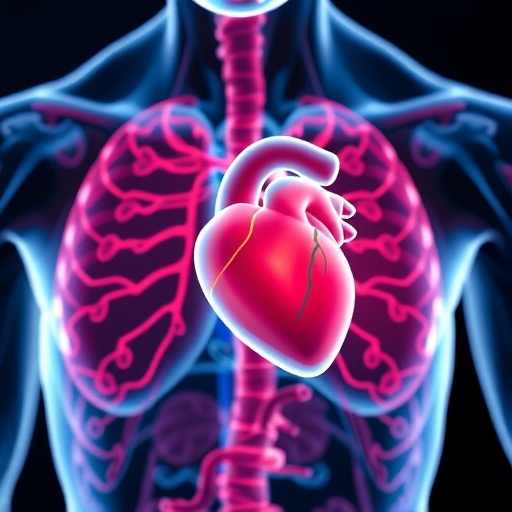In a landmark communiqué dated September 29, 2025, the American College of Cardiology (ACC) unveiled its second Scientific Statement titled “Inflammation and Cardiovascular Disease.” This authoritative document consolidates years of robust clinical and mechanistic research, shedding comprehensive light on the pivotal role of inflammation as a central pathophysiological process driving various cardiovascular diseases (CVDs), including coronary artery disease and heart failure. The statement’s release emerges amidst a growing recognition within the cardiology community that inflammation is not merely a bystander but a fundamental contributor to cardiovascular morbidity and mortality.
Extensive studies have delineated the molecular and cellular architecture underpinning inflammation’s role in atherosclerosis, heart failure, and other cardiovascular pathologies. The statement underscores that systemic inflammation acts as a catalyst for endothelial dysfunction, plaque instability, and myocardial remodeling. Crucially, it identifies the high-sensitivity C-reactive protein (hsCRP) assay as a widely accessible, cost-effective biomarker that quantifies systemic inflammation levels with remarkable precision. Despite ongoing debates about its clinical utility, this document distinguishes hsCRP as a valuable prognostic indicator across the spectrum of primary and secondary preventive cardiovascular care.
In comparative prognostic analyses among patients with established cardiovascular conditions, hsCRP demonstrated predictive power for future adverse cardiac events equivalent to, if not surpassing, low-density lipoprotein (LDL) cholesterol levels. This finding persists even among cohorts undergoing optimized statin therapy, which conventionally aims to reduce LDL cholesterol but does not uniformly mitigate inflammatory activity. Consequently, hsCRP assessment opens avenues for refined risk stratification and personalized therapeutic interventions targeting inflammatory pathways alongside lipid modulation strategies.
Beyond biochemical diagnostics, the Scientific Statement rigorously evaluates lifestyle factors influencing systemic inflammation. Evidence-based recommendations emphasize habitual physical activity, with a minimum threshold of 150 minutes per week of moderate-intensity exercise, as a potent anti-inflammatory modality. Furthermore, dietary regimens such as the Mediterranean and DASH (Dietary Approaches to Stop Hypertension) diets are lauded for their anti-inflammatory nutrient profiles, rich in antioxidants, fiber, and unsaturated fats.
Complementing these recommendations is a spotlight on omega-3 fatty acids, specifically eicosapentaenoic acid (EPA) and docosahexaenoic acid (DHA), predominantly derived from fatty fish consumption. Regular intake—up to two to three servings weekly—is stressed as a critical mediator in attenuating chronic low-grade inflammation and enhancing cardiovascular resilience. These nutritional strategies harmonize with lifestyle management protocols delineated in the 2025 ACC/AHA High Blood Pressure Guideline, reinforcing an integrative approach to vascular health.
At the cellular level, the inflammatory cascade involves complex interactions among immune cells, cytokines, and vascular endothelial cells, culminating in chronic vascular injury and pathological remodeling. The paper delves into mechanisms whereby inflammatory mediators such as interleukin-6, tumor necrosis factor-alpha, and various adhesion molecules orchestrate endothelial activation, promoting leukocyte recruitment and foam cell formation within arterial walls—hallmarks of atherogenesis.
In heart failure paradigms, inflammation interplays with neurohormonal dysregulation, precipitating maladaptive myocardial fibrosis and contractile dysfunction. The statement synthesizes emerging evidence that targeting inflammatory signaling pathways could augment conventional pharmacotherapies, potentially transforming therapeutic landscapes in heart failure management.
The scientific consensus articulated in this statement advocates for hsCRP measurement as an adjunctive tool that supplements lipid profiles, enabling clinicians to tailor interventions that encompass both lipid lowering and anti-inflammatory strategies. Ultimately, integrating inflammatory biomarkers into cardiovascular risk algorithms promises to refine prognostication and optimize patient outcomes.
The document also critically examines pharmacologic agents with anti-inflammatory properties, including novel biologics and repurposed drugs, assessing their efficacy and safety profiles in cardiovascular populations. It opens the discourse for future randomized clinical trials to elucidate the optimal integration of these agents within standard-of-care frameworks.
Notably, the ACC’s comprehensive approach in this Scientific Statement reflects a paradigm shift, championing inflammation as a modifiable cardiovascular risk factor. The synergistic incorporation of biomarkers, lifestyle modifications, and targeted therapeutics embodies a precision medicine ethos aimed at curtailing the global burden of cardiovascular disease.
Published in the Journal of the American College of Cardiology (JACC), this statement is poised to influence clinical guidelines, research trajectories, and patient care paradigms worldwide. It calls for sustained interdisciplinary collaboration between clinicians, researchers, and public health stakeholders to translate these insights into actionable strategies that alleviate cardiovascular inflammation and its sequelae.
In conclusion, the American College of Cardiology’s 2025 Scientific Statement on “Inflammation and Cardiovascular Disease” crystallizes the intricate nexus between inflammatory biology and cardiovascular pathology. As the medical community pivots towards a more nuanced understanding and management of inflammation, this landmark document equips healthcare professionals with the knowledge to harness diagnostic and therapeutic innovations that promise to revolutionize cardiovascular care.
Subject of Research: Inflammation as a pathophysiological contributor to cardiovascular diseases, including coronary artery disease and heart failure
Article Title: Inflammation and Cardiovascular Disease: 2025 ACC Scientific Statement
News Publication Date: September 29, 2025
Web References:
- Journal of the American College of Cardiology (JACC): https://www.jacc.org/doi/10.1016/j.jacc.2025.08.047
- American College of Cardiology: http://www.ACC.org
References: DOI: 10.1016/j.jacc.2025.08.047
Keywords: Cardiovascular disease, Heart disease, Heart failure, Coronary artery disease, Preventive medicine, Cholesterol, Inflammation




